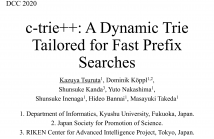
- Read more about Contextual Pattern Matching in Less Space
- Log in to post comments
- Categories:
 32 Views
32 Views
- Read more about Practical Implementations of Compressed RAM
- Log in to post comments
Given a string S over an alphabet of size σ, we consider practical implementations of extended compressed RAM on S, which supports access, replace, insert, and delete operations on S while maintaining S in compressed form. In this paper, we proposed two implementations where each of them is based on the compressed RAM of Jansson et al. [ICALP 2012], and Grossi et al. [ICALP 2013], respectively. Experimental results show that our implementations support the operations efficiently while keeping the space proportional to the entropy of the input during the updates.
- Categories:
 51 Views
51 Views
- Read more about FM-Indexing Grammars Induced by Suffix Sorting for Long Patterns
- Log in to post comments
- Categories:
 60 Views
60 Views
- Categories:
 46 Views
46 Views
- Categories:
 47 Views
47 Views
- Read more about Compressing and Randomly Accessing Sequences
- 1 comment
- Log in to post comments
In this paper we consider the problem of storing sequences of symbols in
a compressed format, while supporting random access to the symbols without
decompression. Although this is a well-studied problem when the data is
textual, the kind of sequences we look at are not textual, and we argue
that traditional compression methods used in the text algorithms community
(such as compressors targeting $k$-th order empirical entropy) do not
perform as well on these sequential data, and simpler methods such
- Categories:
 132 Views
132 Views
- Read more about Compact Representation of Graphs with Small Bandwidth and Treedepth
- Log in to post comments
We consider the problem of compact representation of graphs with small bandwidth as well as graphs with small treedepth. These parameters capture structural properties of graphs that come in useful in certain applications.
- Categories:
 78 Views
78 Views
Given a dynamic set K of k strings of total length n whose characters are drawn from an alphabet of size σ, a keyword dictionary is a data structure built on K that provides locate, prefix search, and update operations on K. Under the assumption that α = w / lg σ characters fit into a single machine word w, we propose a keyword dictionary that represents K in n lg σ + O(k lg n) bits of space, supporting all operations in O(m / α + lg α) expected time on an input string of length m in the word RAM model.
- Categories:
 212 Views
212 Views
- Categories:
 103 Views
103 Views